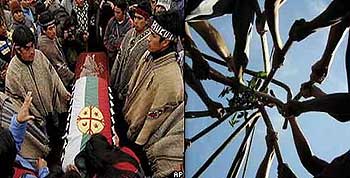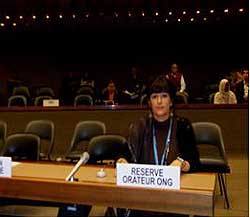



Mapuche Warriors Sacrifice Life for Redemption of Mapuche Nation
By Nina Dean* - 26th Aug 2009
 |
The police murder of Jaime Mendoza Collio on Aug 12th 2009 represents yet another tragic yet avoidable milestone in the history of the Mapuche land rights movement. ______________ Photo: Jaime Mendoza Collio |
The young mapuche land rights defender was taken to his final resting place alongside fellow land rights martyr Matias Catrileo on Sunday 16th August accompanied by his family, friends and community members; they were joined by thousands of grieving Mapuche supporters and activists from throughout the Wallmapu (Mapuche ancestral territory) and beyond. Whilst a traditional Mapuche ceremony marked his passing in the small rural burial ground in the heart of the Mapuche territory, two rainbows appeared in a cross arc in the sky above, perhaps a reflection of comfort and of hope to those who watched on.
The rainbow is indeed analogous to the aims and objectives of the Mapuche Nation who have for centuries fought to live alongside the Chilean state in a peace induced by mutual respect, justice, equality, racial and cultural tolerance and non-violence. Though at such a time in Mapuche history as this, like the rainbow peace is but a fleeting glimpse of a utopia, of what once was and what could be.
The Mapuche Nation have bravely resisted continuous attempts by first the Spanish Colonisers and later the Chilean and Argentinean States to claim their territory and the resources therein aiming to neutralise Mapuche culture and identity by applying a strategy of assimilation. _______________________________ Photo: Nina Dean |
 |
However the hope enshrined in the signing of the treaty of Killen in 1641 by both the Mapuche Nation and the Spanish Crown, which established the official border to Mapuche territory as the Bio-Bio river in the north to the southeren tip of both Chile and Argentina in the south, sought to end this conflict. Unfortunately following Chilean and Argentinean independence in 1810, fifty years later in 1860, the treaty was flagrantly disregarded leading to a new era of assault against the Mapuche people, including mass genocide by the newly formed states. Although this and a number of other treaties remain to this day as legitimate agreements under international law, these nation states continue to breach them, illegally occupying the Wallmapu in order to extract valuable resources at the expense of both the Mapuche and the environment in which they reside.
The subsequent effects upon the Mapuche, human and territorial rights, culture and identity are catastrophic. It appears that the Chilean State will stop at nothing in the pursuit of attaining and securing such resources including the murder and violation of Mapuche people their human rights and fundamental freedoms.
To date there are 37 Mapuche political prisoners in detention in Chile, among them many Mapuche Lonkos (ancestral authorities) and their families. All Mapuche political prisoners were sentenced for protesting against the illicit plunder and occupation of their ancestral lands using the application of State anti-terrorist law, initially introduced under the Pinochet dictatorship but today applied solely against those Mapuche who refuse to comply with the Chilean government’s agenda for the illegal development and expansion of the capitalist state.
Jaime Mendoza Collio is the sixth young Mapuche man in as many years to be killed by state military police. In 2008 police murdered 23-year-old Matías Catrileo and Johnny Cariqueo, aged 23; In 2007 they murdered Rodrigo Cisternas; In 2006 Juan Collihuín Catril, aged 71, was murdered and in 2003 Alex Lemun, aged 17, was also murdered. In 2005 16 year old, José Huenante disappeared without trace whilst held in detention by Chilean police .
It may be significant that traditionally, young Mapuche males who took on the role of Weichafe (soldier) during times of war and resistance in defence of Mapuche territory frequently sacrificed their lives in doing so. Today’s young Mapuche men bravely followed in the footsteps of their forefathers to defend their nation and territory and like their courageous forbearer’s unwittingly laid down their lives for this noble cause.
Following the denial of access of a recent peace mission to the seat of Chilean government as a result of the current crisis, initiated by a group of over one hundred Mapuche Nation Lonkos (chiefs) and supporters. The leaders of the Mapuche Nation made an urgent call to action to the Mapuche people to mobilise and to begin to recover their lands by means of non-violent direct action. A call that echoes that made by Reverend Martin Luther King at the height of the Civil Rights Movement in America.
When after long and considered contemplation the leader of the African American community spoke of non violent direct action and civil disobedience as a necessary tool to be activated only under morally responsible leadership in order to highlight the injustices inherent in state law and the US constitution, stressing that where having tried to seek justice and equality by democratic means and failing as a result of inaccessibility such direct action is ethically justified as a means of raising awareness of the inherent discrepancies in the law. Under such circumstances stated Dr King, civil disobedience can be morally and politically justified. When black Americans led by Rosa Parks committed to acts of civil disobedience by breaking state laws in Montgomery, Alabama in 1955 by refusing an order by the driver to give up her bus seat to a white American passenger on a local bus, she was indeed committing to non-violent direct action as a means of highlighting the injustice and inhumanity of enforced segregation. This was the first step toward freedom and equal rights for black America.
When the British suffragettes launched an attack on property in the UK they did so in order to direct attention and to raise awareness of the right of women to inclusion in the democratic process, a right which European citizens today accept as morally defensible.
When Nelson Mandela was incarcerated for demanding equality and justice for his fellow black south Africans, he carried a torch of hope for his people, for a future free from oppression where equality was the birth right of all citizens. Today he is upheld by his nation and the world as a beacon of peace.
When throughout the Wallmapu the Mapuche occupy lands which legally belong to them as an act of just reclamation, they convey a message of the unified will of their people, and like those who shone a light of peace before them, they remain vigilant in their quest for justice and autonomy. Assured that a light such as this can never be extinguished, as it is in essence the light of truth and the light of truth embodies the illumination of spirit.
Marrichiweu!
(*) Vice Secretary
Mapuche International Link